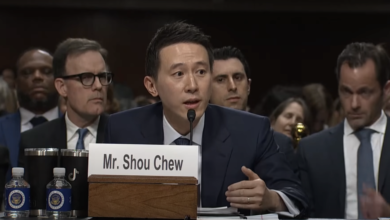 More than one million Sudanese protest foreign intervention in Khartoum, April 5, 2005. Photo: Reuters/Beatrice Mategwa |
One of the biggest lies that the Bush administration tells is that countries that exercise any degree of independence from U.S. imperialism somehow pose a threat to people here in the United States. In order to stress how dangerous these countries supposedly are, the U.S. government accuses them of being the world’s greatest human rights abusers. This is a lie too.
The UN Human Rights Commission meets every year in Geneva, Switzerland. The 2005 session went from March 14 to April 22. In the lead up to the UNHRC this year, headlines all over the capitalist world attacked Cuba, North Korea, Sudan, China and many others as unfit to even participate in the Human Rights Commission.
Oppressed countries denounce U.S. manipulations
This year the U.S. government hopes to pass resolutions condemning North Korea, Cuba, Sudan and others. Washington often uses UN and UNHRC resolutions to build a justification for greater economic aggression and outright invasion. Aware of this strategy, countries threatened by the Bush administration are taking action.
On April 1, a representative from the Democratic People’s Republic of Korea at the Human Rights Convention challenged a resolution sponsored by the United States and the European Union condemning the North Korean government for supposed violations. “The United States is so foolish as to work hard to apply to the DPRK the ‘human rights’ standards it has used for launching aggression and war against other countries and toppling their governments, turning a blind eye to its poor human rights record.
“Its behavior of forcing other countries to change even their political systems and ways of life is nothing but the gravest human rights abuse. The present reality teaches a lesson: the only option for protecting genuine human rights is to struggle against the U.S. with physical strength as long as its policy remains unchanged.”
Sudan is also under attack. In March 2005, the UN passed three separate resolutions on Sudan. The Bush Administration is hoping these resolutions will help bring down the current government of Omar al-Beshir so they can replace it with a more compliant regime.
In defiance of these threats, over a million people took to the streets of Khartoum, the capital of Sudan, on Tuesday, April 5. They demanded that the UN not intervene in the affairs of their country. Demonstrators chanted, “Death to Bush, Death to Blair, Death to Chirac.” One banner in the demonstration read, “We are ready to defend our country!”
This year, as in past years, the United States is also hoping to pass a human rights resolution against Cuba.
Cuba’s minister of foreign affairs, Felipe Perez Roque, responded with a forceful speech at this year’s UNHRC. He called the entire UN into question for continuing to favor stronger over weaker countries: “The Cuban people strongly believe in freedom, democracy and human rights. It took them a lot to achieve [those principles] and are aware of [the] price.
“That is what we Cubans learned long ago and for that reason we built a different country. And we are just beginning. We have done so despite the aggressions, the blockade, the terrorist attacks, the lies and the plots to assassinate Fidel. We know that the Empire is chagrined by this. We are a dangerous example: we are a symbol that only in a just and friendly society; that is, socialist, can there be enjoyment of all rights for all citizens.”
U.S. imperialism: biggest abuser of human rights
The countries in U.S. crosshairs—Sudan, North Korea, and Cuba among others—pose no threat to working people in the United States or anywhere else. They are on the Bush administration’s hit list not for human rights abuses but for pursuing a course independent of total U.S. domination. The United States wants to crack down on any country that deviates from its global plans.
When the U.S. government sought to destroy the governments of Iraq, Afghanistan and Haiti, accusations of gross human rights violations served as the pretext for invasion. Those invasions have led to unimaginable suffering, and represent the real human rights violations.
Over the last sixteen years, successive U.S. governments invaded Iraq twice. Enforcing UN sanctions there lead to the death of over 1.5 million Iraqis. The bombings and the sanctions targeted the civilian infrastructure, including hospitals, schools, shelters and water treatment centers. Without basic medical supplies or clean drinking water, disease spread, life expectancies fell enormously and hundreds of thousands of children died of curable ailments.
During 13 years of sanctions, UN mandates and weapons inspections took away much of Iraq’s defensive capabilities. This disarmament led directly to the U.S. invasion in March 2003. The two U.S. attacks on Iraq have killed and wounded millions of Iraqis—all for a longed planned strategy to colonize the country.
In fact, at last year’s UNHRC, the United States tried to water down criticism of its atrocities in Iraq and of its indefinite and illegal detention of prisoners at Guantanamo Bay in Cuba. The tortures that have taken place in U.S. prisons in Iraq and at Guantanamo Bay are undoubtedly human rights violations. In Iraq alone over 11,000 people have been rounded up and imprisoned. Many of them have been brutally tortured.
 Cuban Foreign Minister Felipe Perez Roque Photo: Bill Hackwell |
The United States continues to hoard the vast wealth of the planet, causing enormous poverty and death. Half of the six billion people in the world live in desperate poverty. Eleven million children under the age of five die every year from hunger and preventable diseases. Instead of solving these and other dire problems, the U.S. government casts the blame on countries that have been forcibly invaded, colonized and consciously underdeveloped over decades and centuries.
In the opening of his March 2005 address to the UNHCR, Cuban Foreign Minister Perez Roque put it plainly: “There cannot be democracy without social justice. … There is no real enjoyment of human rights if there is no equality and equity. The poor and the rich will never have the same rights in real life, proclaimed and recognized as these may be on paper.
“The guarantee of the enjoyment of human rights today depends on whether you live in a developed country or not—and it also depends on the social class that you belong to. Therefore, there will be no real enjoyment of human rights for all as long as we fail to achieve social justice in the relations among countries and within countries themselves.”
In previous centuries, human rights and dignity have been won only through the struggle of the oppressed classes for a better life. It will be the same in this century. The capitalist countries have used incredible savagery to accumulate their wealth, and just as in the past, they will bomb, torture and exploit in order to expand that wealth.
The only real alternative is to fight back. Defending human rights will take more than empty phrases—it will take militant struggle and solidarity to truly save the world’s people from the abuses of the capitalist ruling class.
Venezuela’s Ambassador to the UN, Fermin Toro, summed it up in his presentation to the UNHRC this year: “Powerful nations use the Human Rights Commission to devastate the developing ones.”





